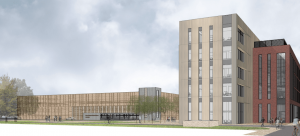The Government spends over £49 billion each year on essential public service contracts. With such large sums of investment into public infrastructure, what consideration is being given to social impact and societal welfare throughout the public procurement process? Commissioners have a duty to taxpayers and communities to ensure the services they buy, or the way in which they are bought, secure wider social, economic, and environmental benefits. It is this commitment to social value that should be central to all procurement decisions. So, what new measures has the UK Government introduced to deliver on social value?
In this article, with support from Vinci and BAM, Framework Manager Faye Dolan will explore the valuable input of public sector procurement on social value and the top ways it can serve our towns and communities.
The Social Value in Procurement Model
New measures launched this year by the Government has seen the Public Services (Social Value) Act 2012 superseded by the Social Value in Procurement Model. The extended criteria will ensure that social value within larger public procurement contracts is fully provided for and evaluated, rather than just considered. The new standards set out to encourage new jobs and skills, promote economic growth and success, and appropriately address climate change in a large-scale effort to level up the UK.
Value throughout the supply chain remains a vital aspect for decision making, but value will be assessed in broader terms than purely a financial context. A bidder’s social impact will also be scored, gauging the supplier’s overall suitability to provide value for money and social value as part of the complete project delivery package.
This new social value model will score and assess suppliers on their ability to support and add value to the following areas:
• Supporting COVID-19 recovery, including helping local communities manage and recover from the impact of COVID.
• Tackling economic inequality, including creating new businesses, jobs, and skills, as well as increasing supply chain resilience.
• Fighting climate change and reducing waste.
• Driving equal opportunity, including reducing the disability employment gap and tackling workforce inequality.
• Improving health and wellbeing and community integration.
How will the Public Procurement Supply Chain be Impacted?
Government departments will adopt the Social Value Model to assess and score suppliers on the positive benefits they can contribute and the added social value they can demonstrate by delivering the contract. The measures provide a fail-safe for projects to deliver on value for money, develop a culture of consideration for socio-economic welfare and build a more robust and diverse supplier base.
This new assessment method creates a huge opportunity for SME’s, start-ups, voluntary/community sector organisations and social enterprises to successfully bid for Government contracts. They are in a prime position to fully demonstrate the extensive value they can offer to a public contract, enabling them to compete with larger organisations with an equal and fair chance of success. Creating an opportunity for more suppliers to be involved in the public procurement supply chain supports more businesses of all sizes nationally, helping with the country’s economic recovery post-Covid, supporting smaller companies to grow, creating more jobs and apprenticeships, and ultimately serving the purpose of having real, tangible, and positive outcomes for local communities.
With more suppliers having an opportunity to engage in government contracts, it widens the portfolio of the supply chain allowing for diversifiable risk, offsetting and mitigating the overall risk apportioned to a singular project, resulting in a stronger and more resilient supply chain capable of delivering within critical budgets and deadlines.
Government departments will be expected to provide their commercial teams with full training to implement the new model effectively and maximise the social value outcome from each project.
Josephine O’Connor, Head of Business & Community Investment at VINCI Facilities Building Solutions, commented: “In VINCI Facilities we have embraced all of the principles of the 2012 Social Value Act: in 2020 alone we delivered the equivalent of £109 million in social value in terms of time, materials, sustainable supply chains and physical changes across many of our projects. But we want to do more and make certain it has real lasting impact on the communities we work with. One way to do that is change how we measure social value. For us, that means everyone, not just VINCI Facilities, has to move on from monetising social value. Gauging the success of social value is not just about numbers. It’s got to have people at its heart. There are a lot of good measurement models out there, but we want to test, share and benchmark our own model that takes a more holistic view of the good that social value can deliver. Like Procure Partnerships, social value is at the heart of everything we do – the Social Value in Procurement Model gives an opportunity to take thing to the next level. Not just embedding the concept of social value in the tender process, but making it a foundation for the delivery process – which has to focus on people oriented outcomes that look to the future generations first and foremost”.
The Top 4 Ways Suppliers Can Demonstrate Social Value:
Social Value UK are a key organisation and professional body for social value and impact management. They strive to support businesses to implement core principles for social value and evaluate their outcomes. As a supplier, the most prominent questions to ask yourself are ‘what problem am I trying to solve? How? Can the results be measured?’ The improvements most social value projects look to address are:
Social/Community
This can include upskilling employees by offering further training opportunities, rewards and benefits schemes for employees including counselling and flexible working, community initiatives such as sports projects, supporting local schools or facilities for the disabled, utilising fair trade and ethical supply chains and providing employment opportunities in the local community.
Sustainability/Environment
This can include a focus on environmentally friendly policies and procurement such as sourcing from a supplier who can deliver multiple materials or services to reduce transport costs and emissions, reducing your carbon footprint, using efficient equipment, and concentrating on sustainable practices to reduce energy and water consumption and waste.
Economic
Considerations can include cost-saving and efficient practices, creating jobs for local people to drive down unemployment, investment in the local area and offering work experience or apprenticeships.
Wellbeing, Diversity & Inclusion
This can include promoting diversity through being an equal opportunity employer, supporting local charities and non-profit organisations, sponsoring events that support mental health awareness and bringing communities together and allowing employees to take part in voluntary days.
We Support Local People and their Communities
Here at Procure Partnerships social value is at the heart of everything we do, and we support our partners to deliver on their corporate social responsibility by investing back into local communities to benefit local people.
Every project procured through the framework has its own social value plan, guaranteeing that 12% of each project’s construction value is directly reinvested into social value activities. The agreed social value targets are strictly governed at framework level and evaluated throughout the project’s lifecycle.
Phil Eves, Education Coordinator, BAM Construction Commented: “Social Value is at the heart of what we do here at BAM Construction, from delivering specialist sessions with local schools to develop the future construction craftsmen and craftswomen to raising academic performance in the communities we work in. This has led to numerous students to consider construction management and the various roles within the industry as a potential career.
We support staff and students in community groups, pre-employment programmes, schools, colleges and universities to engage with our project teams to provide work experience and crucially work placements for those who are trying to get an opportunity to work in construction. We run #How sessions aimed at delivering awareness of STEM careers, these sessions include careers sessions with our Level 4 apprentices, who help support the message of EDI as half of our regional apprentices are women in construction STEM Ambassadors.
Our work placement programme has been developed and is especially relevant today, as we fight back against the effects of the Covid pandemic, giving those who have lost their jobs or who are studying to get into construction, the foot in the door, with our site teams and supply chain. This has resulted in a number of young people securing long term employment with our site teams and supply chain in a variety of different disciplines.
We continue to advocate local spend on all our projects. We specifically target local companies within our supply chain and encourage other local companies to enrol on our supply chain through industry initiatives that include ‘meet the buyer events.’
BAM are committed to using Social Value Portal to provide a consistent impact report at project and framework levels.
We offer practical guidance and training to help employees take actions that positively affect their well-being in the areas of Physical, Social, Financial Wellbeing and Mental Fitness. BAM Construction Steering Group for Mental Health and Wellbeing plan to increase the number of Mental Health First Aiders in 2020 (currently 30 nationally) and rollout awareness courses for managers around mental health, wellbeing and building resilience”.
Click Here To Download a Procure Partnerships Framework User Guide
Twitter
Linkedin

Faye Dolan, an esteemed professional and Framework Director at Procure Partnerships, boasts a rich and diverse career spanning seven years in the construction industry. Faye’s journey within Procure Partnerships began in 2018 as a Key Account Manager, initially overseeing the North West region and later extending her purview to the entire North.



